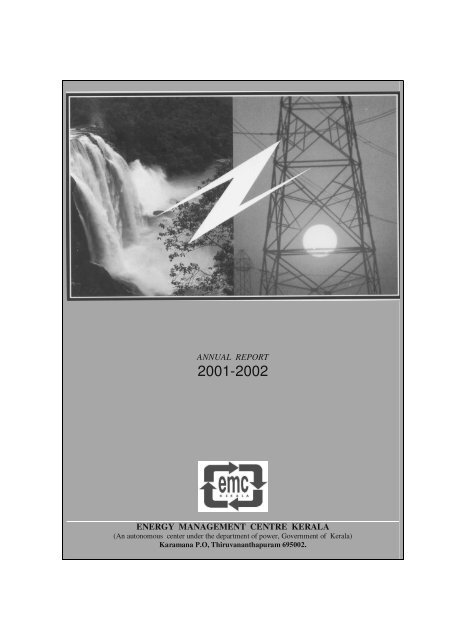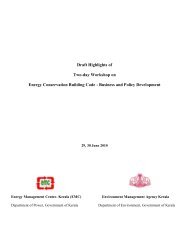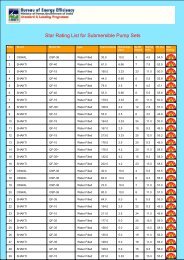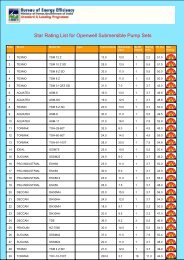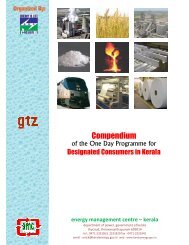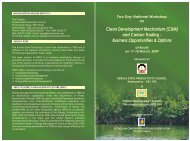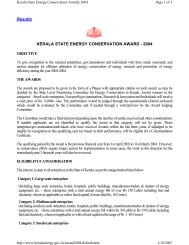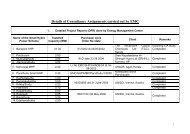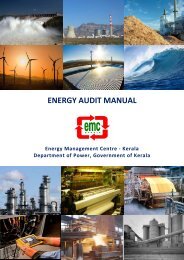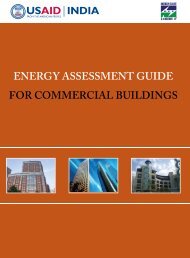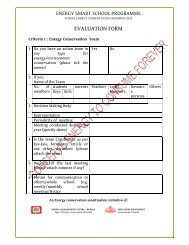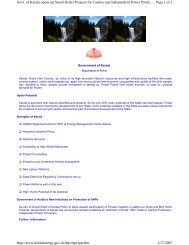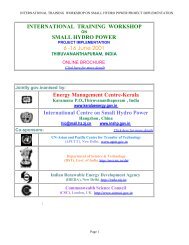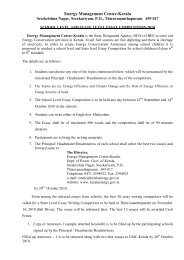2001-02 - Energy Management Centre Kerala
2001-02 - Energy Management Centre Kerala
2001-02 - Energy Management Centre Kerala
You also want an ePaper? Increase the reach of your titles
YUMPU automatically turns print PDFs into web optimized ePapers that Google loves.
ANNUAL REPORT<br />
<strong>2001</strong>-20<strong>02</strong><br />
ENERGY MANAGEMENT CENTRE KERALA<br />
(An autonomous center under the department of power, Government of <strong>Kerala</strong>)<br />
Karamana P.O, Thiruvananthapuram 6950<strong>02</strong>.
1. ORGANISATION & FUNCTIONS<br />
1.1 Introduction<br />
<strong>Energy</strong> <strong>Management</strong> <strong>Centre</strong>, <strong>Kerala</strong>, an organisation registered under the Travancore-<br />
Cochin Literary, Scientific and Charitable Societies Act of 1955 with Reg.No: 139/96, came<br />
into existence on 07-<strong>02</strong>-1996. The office of the organisation is at T.C.20/1441, Poojappura-<br />
Karamana Road , Karamana P.O, Thiruvananthapuram, 695 0<strong>02</strong> .<br />
The <strong>Centre</strong> is an autonomous body under the Department of Power, Government of <strong>Kerala</strong>,<br />
devoted to the improvement of energy efficiency in the State, promotion of energy<br />
conservation and encouraging development of technologies related to energy through<br />
research, training, demonstration programmes and awareness creation. The centre is<br />
networking with institutions within and outside the State for research and training.<br />
This report for <strong>2001</strong>-20<strong>02</strong> highlights the various activities of the <strong>Energy</strong> <strong>Management</strong><br />
<strong>Centre</strong>, <strong>Kerala</strong> in the areas of energy conservation, workshops/training programmes,<br />
demonstration and awareness programmes in the energy sector. The report also gives a<br />
picture of the administrative and financial activities of the <strong>Centre</strong> . During the period under<br />
report two meetings of the Executive Committee (26.06.<strong>2001</strong>, 21.01.20<strong>02</strong>) and one meeting<br />
of the Governing Body (30.06.20<strong>02</strong>) were held.<br />
1.2 Objectives<br />
The objectives of the <strong>Centre</strong> are to facilitate efficient management of all forms of energy, to<br />
promote energy efficiency and energy conservation and to develop new sources of energy as<br />
well as novel energy technologies with a view to increasing production, improving the<br />
quality of life and facilitating the use of energy on a sustainable basis .<br />
In particular the objects are :<br />
1. To develop innovative methodologies and techniques and devise programmes for<br />
efficient energy management .<br />
2. To identify barriers to improving energy efficiency and propose appropriate remedial<br />
approaches including policy measures and financial incentives .<br />
3. To carry out , support and/or promote research studies on energy management .<br />
4. To advise various sectors of economy like industry, transport and agriculture etc., the<br />
agencies connected with energy production, handling and utilisation and the Government<br />
on issues related to all forms of energy and its efficient management .<br />
5. To monitor and promote energy conservation activities in the State of <strong>Kerala</strong> .<br />
6. To increase the skill and capability of energy professionals .<br />
3
7. To act as a nodal agency for generation, collection and dissemination of latest technical<br />
information on energy management and improve the energy information system .<br />
8. To create and maintain a database on supply, demand and prices of energy, energy<br />
efficiency, energy conservation and related technologies .<br />
9. To review laws and regulations that have a bearing on energy efficiency, develop<br />
standards and norms for efficient energy use in the various sectors of economy in the<br />
State and propose modifications .<br />
10. To liaise with national & international organisations, Universities, Research <strong>Centre</strong>s,<br />
Regulatory bodies, funding agencies and such other institutions connected with various<br />
aspects of energy management , including exchange of research results and energy<br />
statistics on energy policy, forecasting and planning techniques .<br />
11. To facilitate exchange of energy experts between the state of <strong>Kerala</strong> and other regions<br />
within India and abroad .<br />
12. To perform such other functions as desired by the Government and undertake such other<br />
activities as are relevant to fulfill the objects of the <strong>Centre</strong> .<br />
1.3 GOVERNING BODY<br />
The following members constituted the Governing body of the <strong>Centre</strong> as on 31..03..20<strong>02</strong><br />
Chairman<br />
1. Shri. Kadavoor Sivadasan (from 26.05.<strong>2001</strong>)<br />
Hon’ble Minister for Electricity<br />
Government of <strong>Kerala</strong><br />
Shri. S. Sarma (upto 17.05.<strong>2001</strong>)<br />
Hon’ble Minister for Electricity<br />
Vice-Chairman<br />
2. Dr. P. K. Iyengar<br />
33, Saras Baug<br />
Bombay 400 088<br />
Chairman, Executive Committee<br />
3. Shri N. V. Madhavan (from May <strong>2001</strong>)<br />
Principal Secretary (Power),<br />
Government of <strong>Kerala</strong><br />
Secretariat<br />
Thiruvananthapuram 695 001<br />
4
Shri. G. Rajasekharan, IAS (upto May <strong>2001</strong>)<br />
Secretary (Power)<br />
Members<br />
4. Smt Sudha Pillai, IAS (from 30.10.<strong>2001</strong>)<br />
Principal Secretary (Finance)<br />
Government of <strong>Kerala</strong><br />
Shri Vinod Rai, IAS (upto 20.10.<strong>2001</strong>)<br />
Principal Secretary (Finance)<br />
5. Dr. M. R. Das<br />
Chairman, State Committee on<br />
Science, Technology and Environment<br />
Sasthra Bhavan, Pattom<br />
Thiruvananthapuram 695 004<br />
6. Er. K. Krishnan Kutty<br />
Member<br />
<strong>Kerala</strong> State Electricity Board<br />
Vidyuthi Bhavanam<br />
Pattom,Thiruvananthapuram 695 004<br />
7. Er. K. Madhavan Pillai<br />
Chief Electrical Inspector to Govt. of <strong>Kerala</strong><br />
Housing Board Building<br />
Thiruvananthapuram 695 001<br />
Er. P. C. Rajan Babu (upto 31.05.<strong>2001</strong>)<br />
8. Dr. R. S. Moni<br />
Director of Technical Education<br />
Fort, Thiruvananthapuram 695 <strong>02</strong>3<br />
Dr. K. Neelakantan (upto 31.03.<strong>2001</strong>)<br />
9. Er. P.S. Sukumaran<br />
Director of Factories & Boilers<br />
East Gate of District Court<br />
Vanchiyoor P.O<br />
Thiruvananthapuram 695 035<br />
Er A. C. M. Mohamed Ali (upto 31.12.<strong>2001</strong>)<br />
5
10. Er. K.S. Vijayan<br />
Director<br />
ANERT<br />
Kesavadasapuram, Thiruvananthapuram 695 004<br />
11. Dr. Asha Thomas (from 20.09.<strong>2001</strong>)<br />
Director<br />
Industries & Commerce Department<br />
Vikas Bhavan, Thiruvanthapuram 695 033<br />
Shri. L. Radhakrishnan IAS (from 22.06.<strong>2001</strong> to 19 .09.<strong>2001</strong>)<br />
Shri. Gyanesh Kumar IAS ( upto 08.06.<strong>2001</strong>)<br />
12. Er. P. Vijayachandran<br />
Chairman<br />
Institution of Engineers(India), <strong>Kerala</strong> <strong>Centre</strong><br />
Observatory Hill, Thiruvananthapuram- 695 033<br />
13. Dr. D Balakrishnan<br />
Chairman, ISTE <strong>Kerala</strong> Section<br />
‘ARUN’, Viyyur<br />
Thrissur – 680 010<br />
14. Director<br />
<strong>Energy</strong> <strong>Management</strong> <strong>Centre</strong><br />
118, Ashirwad Complex<br />
D-1, Green Park<br />
New Delhi 110 016<br />
15. Mr. S. Raghupathy<br />
Adviser<br />
CII (Southern Region)<br />
13, Harrington Road<br />
Chetpet<br />
Chennai 600 031<br />
16. Er. K. L. Kumar<br />
Chairman & Managing Director<br />
Cochin Refineries Ltd.<br />
P.B. No.2, Ambalamugal<br />
Kochi 682 3<strong>02</strong><br />
6
17. Er. K. A. Fathima<br />
Addl. Director<br />
(nominee of Director)<br />
ER & DCI (T)<br />
Vellayambalam<br />
Thiruvananthapuram 695 033<br />
18. Dr. M. R. S. Nair<br />
Director<br />
Autodesk CAD <strong>Centre</strong><br />
5th Floor, M.G. Road,<br />
Kochi 682 035<br />
19. Vacant<br />
Er. P. S. Nair (upto July <strong>2001</strong>)<br />
Managing Director<br />
KMML, Sankaramangalm<br />
Chavara<br />
Kollam 691 583<br />
Member Secretary<br />
20. K. M. Dharesan Unnithan (from 01.07.<strong>2001</strong>)<br />
Director (i/c)<br />
<strong>Energy</strong> <strong>Management</strong> <strong>Centre</strong>, <strong>Kerala</strong><br />
Thiruvananthapuram 695 0<strong>02</strong><br />
Prof. V. K. Damodaran (upto 30.06.<strong>2001</strong>)<br />
Director & Ex-Officio Secretary to Govt.<br />
<strong>Energy</strong> <strong>Management</strong> <strong>Centre</strong>, <strong>Kerala</strong><br />
Thiruvananthapuram 695 0<strong>02</strong><br />
7
1.5 EXECUTIVE COMMITTEE<br />
The following members constituted the Executive Committee for the year ended on<br />
31.03.<strong>2001</strong><br />
Chairman<br />
1. Shri N. V. Madhavan (from May <strong>2001</strong>)<br />
Principal Secretary (Power),<br />
Government of <strong>Kerala</strong><br />
Secretariat<br />
Thiruvananthapuram 695 001<br />
Shri. G. Rajasekharan, IAS (upto May <strong>2001</strong>)<br />
Secretary (Power)<br />
Members<br />
2. Smt Sudha Pillai, IAS (from 30.10.<strong>2001</strong>)<br />
Principal Secretary (Finance)<br />
Government of <strong>Kerala</strong><br />
Shri Vinod Rai, IAS (upto 20.10.<strong>2001</strong>)<br />
Principal Secretary (Finance)<br />
3. Er. K. Krishnan Kutty<br />
Member<br />
<strong>Kerala</strong> State Electricity Board<br />
Vidyuthi Bhavanam<br />
Pattom,Thiruvananthapuram 695 004<br />
4. Er. K. Madhavan Pillai<br />
Chief Electrical Inspector to Govt. of <strong>Kerala</strong><br />
Housing Board Building<br />
Thiruvananthapuram 695 001<br />
Er. P. C. Rajan Babu (upto 31.05.<strong>2001</strong>)<br />
5. Er. P. Vijayachandran<br />
Chairman<br />
Institution of Engineers(India), <strong>Kerala</strong> <strong>Centre</strong><br />
Observatory Hill, Thiruvananthapuram- 695 033<br />
8
7. Er. K. A. Fathima<br />
Addl. Director<br />
(nominee of Director)<br />
ER & DCI (T)<br />
Vellayambalam<br />
Thiruvananthapuram 695 033<br />
Member Secretary<br />
8. K. M. Dharesan Unnithan (from 01.07.<strong>2001</strong>)<br />
Director (i/c)<br />
<strong>Energy</strong> <strong>Management</strong> <strong>Centre</strong>, <strong>Kerala</strong><br />
Thiruvananthapuram 695 0<strong>02</strong><br />
Prof. V. K. Damodaran (upto 30.06.<strong>2001</strong>)<br />
Director & Ex-Officio Secretary to Govt.<br />
<strong>Energy</strong> <strong>Management</strong> <strong>Centre</strong>, <strong>Kerala</strong><br />
Thiruvananthapuram 695 0<strong>02</strong><br />
9
2. EMC COMPUTER FACILITY<br />
The Systems Division of the <strong>Centre</strong> is responsible for successfully managing the center’s<br />
computer facility since the inception of EMC. The Facility integrates and supports more than<br />
5 research groups, technologist labs, documentation systems, Library systems, database<br />
systems, integrated accounting systems, internet terminals, email terminals and research<br />
students engaged in basic and applied research, training, system development etc. Facility<br />
staff provides guidance, consultation services, documentation and assistance in obtaining the<br />
goals of the research groups. The Facility provides one-on-one introductory sessions, and<br />
general advice for new and experienced computer users. With respect to computer and<br />
informatics needs, the goal of these efforts is to enable researchers to become self-sufficient.<br />
Also, EMC is the one of the first institutions in Government sector to provide full computer<br />
and Internet access to all its officers since its commencement of operations in 1997.<br />
In addition, Facility provides personal desktop support for operating systems and popular<br />
applications (e.g. word processing, spread-sheet programs, e-mail), technical assistance for<br />
utilizing specialized features of installed software packages, and preparation of web pages.<br />
The Facility also supports connection of personal computers and laboratory equipment to the<br />
campus-wide local area network.<br />
Services<br />
This facility provides several unique services:<br />
10/100 Mbps Switching Network (3 Com Switches)<br />
Access to specialized software and hardware<br />
Backup of files and data<br />
EMC Web site, Maintenance and Updation of www site<br />
Technical consultation on Hardware and Sotware<br />
Complete installation and customization of new system hardware and software<br />
Full technical support (hardware, software, network)<br />
Personalized software training (hands-on group and individual sessions)<br />
Reference collection designed to support Center research<br />
Advanced documentation services<br />
Optical Character Recognition Systems<br />
Speech Recognition Software<br />
Professional quality graphics and custom technical illustrations<br />
1200 dpi high speed laser printing, Colour Plotter and 720 dpi color printing<br />
Power point presentations<br />
Complete Communication systems like High Speed Faxing and Multi-link Internet access<br />
etc.<br />
POP3 and SMTP email services<br />
SMTP Gateways<br />
10
Network Firewall Protection<br />
Comprehensive Antivirus Protection<br />
Website of EMC<br />
Systems Division of the center has designed, developed and successfully deployed the web<br />
site www.keralaenergy.org. This is in service since June 2000. The website has the latest<br />
information on the <strong>Centre</strong>’s activities and many other resources. The most up-to-date<br />
information on projects, training programmes and workshops are available at the site. The<br />
website is maintained and regularly updated by the systems division of the <strong>Centre</strong>.<br />
Project Training.<br />
<strong>Centre</strong> is providing project facility for B.Tech and MCA students for Information<br />
Technology based projects in <strong>Energy</strong> <strong>Management</strong>, <strong>Energy</strong> Conservation, <strong>Energy</strong> Audits and<br />
<strong>Energy</strong> Database systems.<br />
11
Computer and Information Systems<br />
Email Server<br />
File & Print Server Internet gateway & Firewall<br />
Broadband<br />
Internet Link<br />
10/100/1000 mbps switch<br />
8<strong>02</strong>.11g WiFi<br />
Access point<br />
10/100 mbps switch<br />
10/100 mbps switch<br />
10/100 mbps switch<br />
Main Building<br />
12
3. LABORATORY FACILITIES<br />
The Laboratory facilities at the <strong>Centre</strong> are being gradually built up over the years to make it<br />
capable of conducting R&D and testing work related to energy management and<br />
conservation. Various instruments currently available and extensively used for its R&D and<br />
Consultancy works are:<br />
Sl.<br />
No.<br />
ELECTRICAL<br />
Name of the instrument<br />
1 Portable Load <strong>Management</strong> System Krykard - ALM3<br />
Make & Model<br />
2 Handheld Load Analyser Krykard-Nanovip<br />
3 Datalogger RCC Interlogger<br />
4 Auto LCR-Q Tester Systronics-928<br />
5 Harmonic Analyser Fluke-41B<br />
6 Digital Multimeter Fluke-76<br />
7 Digital <strong>Energy</strong> Meters Unilec<br />
8 Clamp on Harmonic Analyser AEMC Instruments<br />
9 Oscillosopes Philips – OS 9100 P, 100 MHz<br />
Tektronix – TDS 220<br />
10 Multi meter Chauvinarnoux, F11<br />
12 Lux meter Chauvinarnoux ,CA 810<br />
MECHANICAL & THERMAL<br />
10 Heat flux Meter Heat Probe - HB 100<br />
11 Digital Thermometer Fluke 51<br />
12 Non-contact Tachometer Lutron TM 909<br />
13 Bomb Calorimeter Arico-Deluxe<br />
14 Digital Lux Meter Lutron, LX-101<br />
15 Humidity Tester TFA<br />
16 Sound Level Meter Lutron, SL 4001<br />
13
17 Altimeter Barigo 41<br />
18 Pitot Tube IEICOS<br />
19 Pressure Monitor EMCON<br />
20 Infrared Thermometer Lutron TM 909<br />
21 Digital Thermometers K- Type, Chromal -Alumal<br />
RTD, PT-100<br />
2 Digital Manometer MAESTER, M3000<br />
3 Prismatic Compass G/H<br />
4 Air velocity Flow meter AIR FLOW, UK, TA4<br />
5 Flow meter (stream discharge) EMCON<br />
EMC has also procured many other misc. instruments like Voltmeters, Ammeters, Watt<br />
meters, Multimeters, Auto Transformers, Function Generators, Pressure Gauges, Mercury<br />
Thermometers etc. for field work and other experimental purposes.<br />
14
4. LIBRARY<br />
The <strong>Centre</strong> has enhanced its library with the addition of about 103 books in <strong>2001</strong>-20<strong>02</strong>. As<br />
on 31 March 20<strong>02</strong> EMC has 1140 books in the following subject categories.<br />
No. Subject Category No. of books<br />
1. <strong>Energy</strong> <strong>Management</strong> 93<br />
2. Environmental Science & Engineering 160<br />
3. Renewable <strong>Energy</strong> 82<br />
4. Rural Technology 29<br />
5. Mechanical Engineering 68<br />
6. Electrical & Electronics 76<br />
7. <strong>Management</strong> 120<br />
8. Economics 55<br />
9. Computer 88<br />
10. General 57<br />
11. Reference 312<br />
TOTAL 1140<br />
A list of 54 journals/newsletters subscribed by EMC follows.<br />
For selection of the books and to ensure proper functioning and development of the<br />
library through timely modifications/improvements needed and to streamline the entire<br />
process, the <strong>Centre</strong> has reconstituted its Library Committee with Er. K. M. Dharesan<br />
Unnithan Director (i/c), EMC as its Chairman and Er. R. Harikumar, <strong>Energy</strong> Technologist as<br />
the Convener. It was in the different sittings of this committee, decision on purchase of 103<br />
books were taken. Apart from this EMC has institutional membership with British Council<br />
Library, Thiruvananthapuram, and American <strong>Centre</strong> Library, Chennai, to enhance the access<br />
to latest information required for the <strong>Centre</strong>’s activities.<br />
15
LIST OF TECHNICAL JOURNALS<br />
No Name of the Journal No Name of the Journal<br />
1 Asia Pacific tech monitor (Bimonthly) 21 Mobility (News letter)<br />
2 Asian Electricity (A journal of power)<br />
(Monthly)<br />
22 National Geographic Magazine<br />
(Monthly)<br />
3 ASSET (Abstracts of Selected Solar 23 New Scientist (Weekly)<br />
<strong>Energy</strong> Technology) (Monthly)<br />
4 BCN (British Commercial News) 24 Newsweek (Weekly)<br />
(Bimonthly)<br />
5 Cascade 25 P.C.Quest (Monthly)<br />
6 Cogeneration and onsite power 26 Power Line (Monthly)<br />
production (Bimonthly)<br />
7 Computers Today (Monthly) 27 Pumps India (Bimonthly)<br />
8 Dhanam (Monthly) 28 Regulateri ( Quarterly Newsletter)<br />
9 Down to Earth (Fortnightly) 29 Repsovision (Quarterly)<br />
10 Electrical India (Monthly) 30 Scientific American (Monthly)<br />
11 <strong>Energy</strong> & Fuel users ‘Journal<br />
31 Span (Bimonthly)<br />
(Quarterly)<br />
12 FOCUS (Bimonthly) 32 Standards India (Monthly)<br />
13 Harvard Business Review (Monthly) 33 Team frontliner (news letter)<br />
14 Hi-Tech-Voice (Journal of the KSEB 34 TERI Newswire (Fortnightly)<br />
Post Graduate Engineers Association)<br />
15 Home <strong>Energy</strong> (Bimonthly) 35 TERISCOPE (Quarterly)<br />
16 Indian Journal of Transport<br />
<strong>Management</strong> (Monthly)<br />
36 The Bulletin on <strong>Energy</strong> Efficiency<br />
(Monthly)<br />
17 Indian Society for Technical Education<br />
(News letter)<br />
37 The Bulletin on <strong>Energy</strong> Efficiency<br />
(Monthly)<br />
18 Information Technology (Monthly) 38 TIDE (Teri Information Digest)<br />
19 Invention Intelligence (Bimonthly) 39 Tree India Environment (Bimonthly)<br />
20 Managers Update (Monthly)<br />
16
5. R & D PROGRAMS<br />
1. Design and Development of a High Efficiency Low Cost Solar Collector.<br />
EMC has developed a High Efficiency Low Cost Solar Collector. The design of the solar<br />
collector is in such a way that the maximum heat absorbed by the collector plate is recovered<br />
for heating the water circulated in a concentric tube. This is achieved by increasing the<br />
surface area for heat transfer. The concentric tubes are fitted at the top of flat collector plate<br />
with clips. The water flows with gravitational force. The cold water enters through the inlet<br />
at the centre of the configuration. The collector plate is fixed to a wooden frame sandwiched<br />
with insulation materials. The absorber plate is a single toughened glass plate. The solar<br />
collector is developed and installed and preliminary tests are conducted. The initial results<br />
are highly encouraging. Further studies and measurements and evaluation are underway.<br />
2. Voice Interactive Response system<br />
The <strong>Centre</strong> is in the process of developing a voice interactive system for introducing in the<br />
KSEB section office. This project is done in association with the R & D division of CMS<br />
computers Ltd., Thiruvanthapuram. The system in addition to providing electronic complaint<br />
registry would also act as an accounting tool.<br />
3. <strong>Energy</strong> Metering, Monitoring and <strong>Management</strong> System<br />
EMC in association with M/s CMS Computers, is developing an <strong>Energy</strong> Metering,<br />
Monitoring and <strong>Management</strong> System for KINFRA for their Industrial Units. Preliminary<br />
discussions are over and it was decided to install the system at their Video Park at<br />
Kazhakoottam, Thiruvananthapuram.<br />
4. Development of Modified Thaapabharani.<br />
The thaapabharani, a cost effective thermal cooker developed by EMC is a highly energy<br />
saving device to be used in all household kitchens of <strong>Kerala</strong> families due to the peculiar<br />
dietary habits of Keralites. The thaapabharani can save upto 75 % of energy while cooking<br />
rice. During the promotion period it has been observed that the thaapabharani needs<br />
improvement to increase its service life and also needs modifications to make it more<br />
attractive. With this view in mind, EMC has developed an improved version of<br />
thaapabharani.<br />
The improved thaapabharani (Urja –2), is made of polypropylene and expanded polystyrene.<br />
The thermocole kept inside is fully covered with polypropylene sheets. The design has been<br />
modified for the handle also. The modified thaapabharani tested in the laboratory shows<br />
17
higher thermal efficiency and also more attractive and durable. The proto has been<br />
developed and field trial tests are being conducted. The present ash colour is most fitting for<br />
it to find a good place in kitchens. The strategy is to provide training to the local women<br />
group and make it available locally. The fabrication process for the improved one is made<br />
very simple. The employment potential for the device has generated special interest among<br />
women groups and also it has been identified as a powerful means for women empowerment<br />
in various welfare projects in <strong>Kerala</strong>. The device is ideal for <strong>Kerala</strong> kitchens and well<br />
suitable for cooking tapioca, different dhal items, bengal gram etc.<br />
5. The <strong>Energy</strong> Efficient Design Of ‘PETTI & PARA’ – A Traditional Dewatering<br />
System In Kuttanadu – <strong>Kerala</strong>. (Continuing project)<br />
The ‘Petti & Para’ is a conventional dewatering system widely used in the Kuttanadu paddy<br />
fields. The Kuttanadu area is a major agricultural land of <strong>Kerala</strong> for paddy. The peculiarity<br />
of this area is that the land level is 1- 2 meters below sea level and hence during the rainy<br />
seasons, water has to be pumped out from the vast fields as quickly as possible, otherwise the<br />
crops would be drowned. The dewatering system used is a conventional axial type of pump<br />
with large discharge. The impeller is driven by electric motor and the power transmission is<br />
through belt drive. The technology problem of the system is that the overall efficiency is less.<br />
The design improvement of the system has been done with advanced computer software<br />
packages.<br />
The design improvement is made in different stages, which are given below.<br />
Improvement of fluid path and hence to reduce the hydraulic losses.<br />
Changing the power transmission system to reduce energy losses.<br />
Selection of suitable material for durability, lesser cost, reduces transportation cost and<br />
lower maintenance.<br />
Improving the impeller design for maximum hydraulic gain.<br />
A proto model has been developed with the 12 HP motor directly mounted on the system to<br />
reduce energy losses and also the fluid path has been modified. Various tests have been<br />
conducted on the proto and the projected savings in energy is 50 %. However, the fact that<br />
the impeller rotates with higher speed and also the perceived advantage of higher flow rate<br />
than design specifications has to be taken into account. The savings are calculated based on<br />
a similar pump with the similar flow rate. Obviously, lot of practical losses is eliminated and<br />
energy saved. Apart from the energy savings other social benefits are also envisaged. The<br />
farmers are more interested in pumping out more water in less time. In this proto itself it has<br />
been apparent that the amount of water pumped out in 24 hours by conventional system of<br />
the same capacity could be pumped in 6-8 hours. This is a major factor for social acceptance<br />
among the rural folk there. Efforts are on to further improve the design and to make it user<br />
friendly and also to popularise in a big way.<br />
18
6. CONSULTANCY PROJECTS<br />
This financial year (April <strong>2001</strong> to March 20<strong>02</strong>) saw a tremendous hike in the annual turnover<br />
of the division in terms of cost of projects (about Rs 11 lakhs) undertaken and the<br />
contribution of this division’s activities (around 45%) to the total direct project expenses of<br />
the <strong>Centre</strong>. Refer the following graph. This has been achieved when the <strong>Centre</strong> secured a<br />
major project from the United Nations Industrial Development Organisation (UNIDO),<br />
Vienna, for improving energy efficiency in glass industries in Firozabad.<br />
Training & Consultancy Division - a glance<br />
Project cost (Rs Lakhs)<br />
12<br />
10<br />
8<br />
6<br />
4<br />
2<br />
60<br />
50<br />
40<br />
30<br />
20<br />
10<br />
Contribution by the<br />
division (% of total direct<br />
project cost)<br />
0<br />
1997-1998 1998-1999 1999-2000 2000-<strong>2001</strong> <strong>2001</strong>-20<strong>02</strong><br />
Period (9th Five Year Plan)<br />
0<br />
Brief details of the projects undertaken during April <strong>2001</strong> to March 20<strong>02</strong><br />
<strong>Energy</strong> Study In Rice Mills<br />
This study was carried out in three rice mills in the State – one each from the tiny sector,<br />
medium scale and modern mill, as an initial energy assessment aimed at evolving energy<br />
efficiency improvement projects in this traditional sector. The study identified the feasibility<br />
of introducing humidity controllers in the dryers used in modern rice mills to reduce the<br />
steam consumption as well as improve the product quality, ie., reducing brokens. The study<br />
was carried out jointly with the <strong>Kerala</strong> State Productivity Council.<br />
19
<strong>Energy</strong> Efficiency Improvement Study In Foster Foods (P) Limited, Thrissur<br />
The above consultancy assignment awarded by the Foster Foods was carried out jointly with<br />
the Institute for <strong>Energy</strong> Studies, Anna University, Chennai, as part of the <strong>Centre</strong>’s objective<br />
of assisting the Small & Medium Enterprises in the State to enhance their energy efficiency.<br />
The study could identify about nine energy efficiency improvement measures in the unit,<br />
which when implemented would reduce the energy cost by about Rs 4 lakhs with an initial<br />
investment of Rs 2 lakhs.<br />
UNIDO Project<br />
Improving <strong>Energy</strong> Efficiency In The Glass Industry In India Through Process Control<br />
Hardware/Software Package<br />
Firozabad glass industry, about 300 years old, accounts for more than 70% of glass items,<br />
produced in India in the unorganised sector, employing over 1.50 lakhs people. Based on<br />
outcome of an “<strong>Energy</strong> efficiency project” executed by EMC in the traditional brick & tile<br />
sector; United Nations Industrial Development Organisation (UNIDO), as a part of its<br />
ongoing project entitled “Integrated <strong>Energy</strong> and Environment Programme in Glass Industry”<br />
in India, awarded a project to EMC to develop and implement a process control hardware<br />
software package for enhancing energy efficiency and productivity of glass industry. EMC in<br />
association with CMS Computers Limited (CMS), an R&D lab recognised by the<br />
Department of Scientific & Industrial Research (DSIR) initiated a comprehensive research on<br />
how to intervene in this traditional sector without going in for costly change-over to modern<br />
furnaces, to which the industry is highly reluctant. It was then decided to retrofit the existing<br />
furnaces with intelligent systems drawing on the capabilities of Information Technology (IT).<br />
The project, which commenced during January <strong>2001</strong> succeeded in indigenously developing a<br />
Temperature Monitoring and Alerting System (TMAS), a microprocessor, based tool, which<br />
would monitor the temperature in different zones of the glass melting system and alert the<br />
operator when the temperature exceeds the set values. The system also logs the real time<br />
temperature at different zones so as to act as a <strong>Management</strong> Information System (MIS) tool.<br />
TMAS has been successfully commissioned in Delux Glass having a 2.25 TPD open pot<br />
furnace on the first week of June ’01 and at Tiger Sons Pvt. Ltd., employing a 24 TPD tank<br />
furnace on the second week of July ‘01. More than effecting a reduction in CNG<br />
consumption in Delux Glass Industries, the system provides prominent benefits in terms of<br />
improved pot life due to control on limit of maximum permissible temperature. Additional<br />
benefits include improved furnace life; product quality leading to increased productivity and<br />
profitability, which would help this traditional sector to face stiff competition in this current<br />
economic scenario. The additional benefits when combined together in terms of CNG saving,<br />
would be many fold of direct CNG saving.<br />
The energy saving capability and other benefits of the system, installed in the two industries,<br />
were discussed with a user group on 11 July ’01 and demonstrated to them on 12 July ’01 in<br />
the presence of Professor V K Damodaran, Director of EMC and the team leader for this<br />
20
project. Shri R N Bhargava, Principal Director, <strong>Centre</strong> for the Development of Glass Industry<br />
(CDGI), UNIDO sponsored R&D <strong>Centre</strong> which supported this endeavor chaired the meets.<br />
Mr. Harish Agrawal, owner of Delux Glass felt that the system could help to save around 6<br />
pots a month for present furnace and hope they could be relieved to some extent from the<br />
nuisance caused by pot breakage, thanks to TMAS. Mr. Dharmendra Gupta, partner of Tiger<br />
Sons is very hopeful of the system providing precise current and recorded temperature<br />
profile, very much helpful in saving fuel and increasing overall productivity. Shri Devendra<br />
Sah, Senior Glass Technologist of CDGI, who is co-ordinating the project in Firozabad, also<br />
working on an automatic temperature controller for these units, told that TMAS should be<br />
highly acceptable to gas fired glass industries if the alarms be replaced with the temperature<br />
controller. Shri R Harikumar of EMC, Shri N T Nair, Vice President of the R&D division of<br />
CMS, Shri P Dhandapani and Shri K Prabhath of CMS formed the team which could manage<br />
this successful intervention of a high-tech system into a traditional industrial cluster. Mr.<br />
Alexander Varghese who is co-ordinating this project from the UNIDO headquarters at<br />
Vienna said, “TMAS would be a sparkling example of symbiotic synchronisation of energy<br />
conservation research with IT. Strategically the econo-ecological implication of this project<br />
could bring sustainable development benefits to developing and third world countries where<br />
similar glass industry exists”.<br />
It has to be noted here that based on the successful completion of the project within the<br />
specified timeframe, UNIDO has awarded an additional contract to modify the system and<br />
install it in five more units, which is now under progress.<br />
Economic Efficiency Study of Distribution Transformers<br />
EMC conducted a sample study on the economic efficiency of two distribution transformers<br />
at Vazhuthacad and at Thrikkannapuram. Based on the study it was felt that a more detailed<br />
study is necessary on these transformers for identifying and preventing various energy losses.<br />
For conducting a detailed study, EMC has selected the Vazhuthacaud transformer, since the<br />
numbers of consumers are less and the area of distribution is less with all types of consumers.<br />
It is also noticed during the study that some of the meters are seen faulty (either not working<br />
or giving erroneous reading) which accounts for a great loss to KSEB. The detailed action<br />
plan for the study has already been submitted to KSEB.<br />
21
7. TRAINING, SEMINARS AND WORKSHOPS<br />
International Training Programmes<br />
EMC organized a 10 day long International training workshop on “SHP Project<br />
Implementation” jointly with UNIDO sponsored International Network on Small Hydro<br />
Power (IN-SHP), Hangzhou, China at ITDC Hotel, Kovalam. Hon’ble Minister for<br />
Electricity Shri. Kadavoor Sivadasan inaugurated the training workshop on 06.06.<strong>2001</strong>. The<br />
Coordination Committee meeting of IN-SHP was also hosted by EMC at Kovalam from 7-8<br />
June <strong>2001</strong>.<br />
The following training programmes were arranged by EMC during the reporting period.<br />
Date/Place For Whom and Subject Organised by<br />
<strong>02</strong>.04.<strong>2001</strong> onwards<br />
Akkulam<br />
07.04.<strong>2001</strong><br />
Thiruvananthapuram<br />
22.04.<strong>2001</strong><br />
Thiruvananthapuram<br />
23.05.<strong>2001</strong><br />
Kochi<br />
06.06.<strong>2001</strong><br />
Thiruvananthapuram<br />
15.08.<strong>2001</strong><br />
Thiruvananthapuram<br />
Hindustan Latex Ltd, Akkulam. a<br />
series of lectures on <strong>Energy</strong><br />
Conservation Practices in Industries,<br />
<strong>Energy</strong> Quiz and Essay competition<br />
were organized for HLL employees<br />
A brain storming session on<br />
Technology <strong>Management</strong> needs of<br />
SMEs with industry participation<br />
Earth Day celebrations <strong>2001</strong><br />
A three day Trainers’ Training<br />
workshop for <strong>Energy</strong> Conservation<br />
volunteers<br />
GIS initiatives for <strong>Kerala</strong><br />
Domestic <strong>Energy</strong> Conservation<br />
awareness programme at Indira<br />
Nagar Residents Association,<br />
Peroorkada<br />
18.08.<strong>2001</strong>, Kochi Electrical wireman, Supervisors and<br />
Contractors. “<strong>Energy</strong> Conservation<br />
and best practices in House wiring”<br />
21.09.<strong>2001</strong>,<br />
Thiruvananthapuram<br />
28.09.<strong>2001</strong><br />
Thrissur<br />
12.10.<strong>2001</strong><br />
Attipra, Tvpm<br />
Electrical wireman, Supervisors and<br />
Contractors. “<strong>Energy</strong> Conservation in<br />
Lighting”<br />
Electrical wireman, Supervisors and<br />
Contractors. “<strong>Energy</strong> Conservation<br />
and best practices in House wiring”<br />
One day training programme on<br />
<strong>Energy</strong> Conservation for ITC<br />
students.<br />
EMC and Hindustan<br />
Latex Ltd.<br />
EMC<br />
EMC, GREENS & CESS<br />
EMC and OISCA<br />
International, Calicut<br />
EMC & Spatial Data Ltd.<br />
Bangalore<br />
EMC<br />
EMC and International<br />
Copper Promotion<br />
Council of India, Mumbai<br />
EMC and Rotary Club<br />
EMC and International<br />
Copper Promotion<br />
Council of India, Mumbai<br />
EMC and Scheduled<br />
Caste Development Dept.<br />
22
08.11.<strong>2001</strong><br />
Thiruvananthapuram<br />
15.11.<strong>2001</strong><br />
Thiruvananthapuram<br />
18.11.<strong>2001</strong><br />
Thiruvananthapuram<br />
21.11.<strong>2001</strong><br />
Thiruvananthapuram<br />
03.12.<strong>2001</strong><br />
Kottayam<br />
09.12.<strong>2001</strong><br />
Thiruvananthapuram<br />
19.01.<strong>02</strong><br />
Kozhikkode<br />
08.<strong>02</strong>.20<strong>02</strong><br />
Kachani, Tvpm<br />
20.<strong>02</strong>.20<strong>02</strong><br />
Palakkad<br />
30.03.20<strong>02</strong><br />
Thiruvananthapuram<br />
PWD Electrical Wing Engineers on<br />
“Building Electrification & <strong>Energy</strong><br />
Conservation”<br />
<strong>Energy</strong> Clinic Volunteers<br />
Supervisors of Travancore Titanium<br />
Products Ltd. on <strong>Energy</strong><br />
Conservation<br />
Electrical wireman, Supervisors and<br />
Contractors. “<strong>Energy</strong> Conservation<br />
and best practices in House wiring”<br />
Electrical wireman, Supervisors and<br />
Contractors. “<strong>Energy</strong> Conservation<br />
and best practices in House wiring”<br />
Residents Association Members on<br />
Domestic <strong>Energy</strong> Conservation<br />
Electrical wireman, Supervisors and<br />
Contractors. “<strong>Energy</strong> Conservation<br />
and best practices in House wiring”<br />
Domestic <strong>Energy</strong> Conservation<br />
awareness programme at Kachani<br />
Mahathama Gandhi Residents Assn.<br />
Electrical wireman, Supervisors and<br />
Contractors. “<strong>Energy</strong> Conservation<br />
and best practices in House wiring”<br />
Domestic <strong>Energy</strong> Conservation<br />
awareness programme at<br />
Madathuvila residents Association.<br />
EMC, PWD Ele. Wing,<br />
EMC<br />
EMC & TTP<br />
EMC and International<br />
Copper Promotion<br />
Council of India, Mumbai<br />
EMC and International<br />
Copper Promotion<br />
Council of India, Mumbai<br />
EMC & Institution of<br />
Engineers<br />
EMC and International<br />
Copper Promotion<br />
Council of India, Mumbai<br />
EMC<br />
EMC and International<br />
Copper Promotion<br />
Council of India, Mumbai<br />
EMC<br />
Commonwealth Programme<br />
Commonwealth Secretariat, London had invited a team of Engineers from <strong>Energy</strong><br />
<strong>Management</strong> <strong>Centre</strong> to Sri Lanka to impart necessary training on <strong>Energy</strong> Conservation<br />
Methods and also to elaborate the advantages of Thappabharani – an <strong>Energy</strong> saving thermal<br />
cooker developed by EMC. A three-member team consisting of Er. K. M. Dharesan<br />
Unnithan, Er. M. Udayabhanu and Er. V. Ajit Prabhu visited Sri Lanka during the month of<br />
October <strong>2001</strong> for a period of 6 days.<br />
Thaapabharani fabrication Training.<br />
The thaapabharani, the energy saving cost effective thermal cooker is propagated by<br />
providing fabrication training to the women groups and assisting them to fabricate and<br />
market locally. This year, the training has been provided to nearly 60 women from various<br />
local women voluntary organisations. Apart from the training EMC organised public<br />
functions to promote the device. The functions consisted of talk on energy conservation with<br />
practical demonstration.<br />
23
Report on the Tour to Sri Lanka in connection with the Establishment of a<br />
Commonwealth Knowledge Network (CKN) on Cost Effective <strong>Energy</strong><br />
Saving Devices.<br />
<strong>Energy</strong> <strong>Management</strong> <strong>Centre</strong>-<strong>Kerala</strong> (EMC) with its wide and integrated activities; is known<br />
world over as a centre of excellence. EMC has made great contributions on energy<br />
management; right from energy generation and up to energy utilisation. EMC has very<br />
unique activities in the area of energy conservation. <strong>Energy</strong> Clinic and cost effective energy<br />
saving devices and techniques are some of the important and powerful programmes meant<br />
for energy conservation in the rural population. Commonwealth Knowledge Network (CKN)<br />
has come to know about EMC earlier and together had some programmes. CKN recently has<br />
shown interest in the joint programmes for the benefit of Sri Lanka also. CKN has identified<br />
a team of experts from EMC for the purpose of assessing the potential of joint energy<br />
management activities and also to create an awareness of thaapabharani – the cost effective<br />
energy saving thermal cooker developed by EMC. The following were the persons in the<br />
team who went to Sri Lanka.<br />
1. Er. K M Dharesan Unnithan, Director (i/c) of EMC<br />
2. Er. M. Udayabhanu, Head (Training & Consultancy) of EMC<br />
3. Er. Ajit Prabhu. V, Head (Rural <strong>Energy</strong>) of EMC.<br />
The team went to Sri Lanka on 24-10-<strong>2001</strong>.The organisors picked the group from the<br />
Katunayake Air port. The details of the activities are given below.<br />
Work Shop at the Youth Services Council Hall at Maharagama, 1530 hrs on 25.09.<strong>2001</strong><br />
A big function was organised at the Youth Services Council Hall at Maharagama. A<br />
heterogeneous group of women, children, school teachers, social workers, students etc.<br />
participated in the workshop with high enthusiasm. Dr. Perera gave an introductory remark<br />
and talked high about CKN-EMC collaboration and its activities. Subsequently, Er. K. M.<br />
Dharesan Unnithan, Director –in-Charge of EMC gave an exhaustive talk about various<br />
activities of EMC and opened-up some areas where discussions could be initiated on joint<br />
programmes. Later Er. M Udayabhanu talked on the genesis of thaapabharani and its features<br />
and advantages. There was a live demonstration of cooking rice on thaapabharani with LPG<br />
stove. The energy savings were very obvious and the entire group got excited to note that<br />
there were more than 75 % of energy saving. Then Er. Ajit Prabhu. V explained the working<br />
principle and the benefits of energy saving devices especially thaapabharani. The group<br />
raised so many doubts which showed their interaction and enthusiasm. Er. Ajit Prabhu gave<br />
some ideas about the fabrication of the thaapabharani. The group performance showed that<br />
the function was very successful. People were eager to get the energy saving devices and<br />
keen on understanding energy conservation potential for sustainable development.<br />
24
On 26-10-01 at Wattegama, Kandy<br />
There were two programmes on that day one in the morning and the other in the evening.<br />
The morning programme was organised at the Public Library Hall, Wattegama. The<br />
programme started at 10.00 am. Which was presided over by the Municipal Council<br />
Chairman. There were also social workers and environmentalists who participated in the<br />
programme. Most of the audience were students who are the right target group for the<br />
mission of energy conservation because they may be the worst hit people in future due to<br />
scarcity of energy sources. Women, local political leaders, school teachers, scholars etc.<br />
were also there among the audience. The Municipal Council Chairman gave an introductory<br />
talk highlighting the ancient interaction between India and Srilanka and also talked high<br />
about the EMC and its activities. Er. K.M. Dharesan Unnithan dwelt on the EMC activities<br />
and made useful notes on the areas where there can be joint collaborative programmes.<br />
Subsequently, Er. M Udayabhanu gave a lecture on thaapabharani and its features. He also<br />
stressed another programme of EMC that is <strong>Energy</strong> Clinic to effectively propagate the energy<br />
conservation principles. Er. Ajit Prabhu explained the working of thaapabharani with<br />
practical demonstration. The group was very much excited and were enthusiastic to know<br />
more about the thaapabharani. Mrs. S S Ilangakoon, Librarian expressed vote of thanks.<br />
There was another programme on the same day at 04.00 pm on the Dorhgamuwh<br />
(Doramadulla Cave temple) hill top temple. That was an isolated hilly village with less<br />
population. Majority use firewood as the cooking fuel. Also they use low efficient country<br />
type fire wood stoves. Therefore that is an ideal village to apply the energy conservation<br />
techniques. Moreover all the villagers are low income groups. The programme started with<br />
prayer and in the presence of the local Buddhist monk. The programme was similar in other<br />
places like the talks by Er. K. M. Dharesan Unnithan, Er. M Udayabhanu, and Er. Ajit<br />
Prabhu. The demonstration of thaapabharani was very much appreciated by the local people.<br />
Every one was interested in procuring one each. The fabrication methodology was told to<br />
them and the way for further training programme was made open.<br />
The full day on 27.10.01 was used for travelling from Kandy to Badulla<br />
Work Shop at Uva Community Development Center, Badulla on 28-10-01 at 1000 hrs.<br />
Badulla is a hilly region in the mid Srilanka, covered with greenaries and with tea<br />
plantations. Most of the local people are workers for tea plantations and economically below<br />
average. The programme was organised at the Uva Community Development Center which<br />
is a powerful social welfare organisations. A large group of women participated in the<br />
programme. The Chairman of the organisation Mr. Manels presided over the function. The<br />
group consisted of tamilians and singhalis. Hence two translations were there. Er. K. M.<br />
Dharesan Unnithan talked about energy conservation and the need for energy conservation.<br />
He explained about EMC and its various activities. Er. M Udayabhanu explained the cost<br />
effective energy conservation technolgies with special reference to thaapabharani. There<br />
was demonstration of thaapabharani by Er. Ajit Prabhu. The women group raised a number<br />
of doubts which were clarified and also a small demonstration of how the device is<br />
assembled was shown by Er. Ajit Prabhu.<br />
25
On 29-10-01 at Colombo<br />
The major programme on that day was the interview with the TNL – a premier TV channel<br />
of Sri Lanka. Dr. Perera, Er. K. M. Dharesan Unnithan, Er. M Udayabhanu, Er. Ajit Prabhu<br />
participated for the TV programme. The programme was just like a question answer session.<br />
Various questions about EMC, energy conservation, potential of energy conservation in<br />
Srilanka, energy conservation devices, thaapabharani etc. were discussed. The discussion<br />
lasted for 20 minutes.<br />
With this the programmes came to an end and the team returned to Trivandrum on 30-10-01.<br />
……..<br />
26
8. STATE ENERGY CONSERVATION AWARDS<br />
<strong>Kerala</strong> State <strong>Energy</strong> Conservation Award <strong>2001</strong><br />
In its efforts to encourage energy conservation activities in the State, applications for <strong>Energy</strong><br />
Conservation awards instituted by Government of <strong>Kerala</strong> are invited every year by the<br />
<strong>Energy</strong> <strong>Management</strong> <strong>Centre</strong>. The Government decided to give awards for the financial year<br />
2000-‘01 in 10 different categories, viz.,<br />
Large scale industries<br />
Medium scale industries<br />
Small scale industries<br />
Transport organisations<br />
Building Complexes<br />
Local bodies<br />
Research & Development centres<br />
Manufacturers of energy efficient equipments & traders/dealers<br />
NGOs/individuals<br />
Journalists/electronic media persons/publishers/writers<br />
A judging committee consisting of Er M Udayabhanu, Head – Consultancy & Training,<br />
EMC, Prof. P O J Lebba, President, <strong>Energy</strong> Conservation Society, Er M G Rajagopal,<br />
Additional Chief Electrical Inspector to Govt. and Dr R Sethumadhavan, Institute for <strong>Energy</strong><br />
Studies, Anna University, Chennai and the State Level Monitoring Committee chaired by the<br />
Principal Secretary (Power), Shri. N V Madhavan, IAS assisted the Government in assessing<br />
the achievements of the various contestants.<br />
The qualifying period for the award is the previous financial year from 1st April 2000 to 31st<br />
March <strong>2001</strong>. However, as conservation efforts require longer period for implementation in<br />
some cases, the continuing work in this direction for the immediately past 3 financial years<br />
has also been reviewed.<br />
In the case of industries, transport organisations and building complexes, the basis has been<br />
the percentage energy savings by deliberate efforts of the organisation. Weightage has been<br />
given for technology used, measures such as house keeping, interfuel substitution, change<br />
over to sustainable practices, replicability, etc. Manufacturers and traders have been assessed<br />
27
for their contribution in this field. In the case of awareness creation category, the assessment<br />
has been based on outstanding nature of their activities.<br />
The State Level Monitoring Committee for <strong>Energy</strong> Conservation in <strong>Kerala</strong>, on evaluating the<br />
various entries for State level awards and ascertaining the facts through discussions and field<br />
visits by a Judging Committee, selected the following organisations/individuals for<br />
conferring the Government of <strong>Kerala</strong> <strong>Energy</strong> Conservation Awards and Commendation<br />
Certificates <strong>2001</strong> for their achievements in energy conservation during the year 2000-‘01.<br />
The awards were conferred to the winners at 1500 hrs on 14 December <strong>2001</strong> at<br />
Thiruvananthapuram (Mascot Hotel) by the Hon.’ble Shri. Kadavoor Sivadasan, Minister for<br />
Electricity.<br />
1. Large scale industries<br />
Award for Hindustan Newsprint Ltd., Newsprint Nagar, Kottayam<br />
Award was given to HNL based on the percentage reduction in energy consistently for the<br />
last three years through continual improvements in operating parameters, energy efficiency<br />
improvements in motors, better house-keeping, successful utilisation of latest energy efficient<br />
technologies implemented in previous years, commissioning the project on utilisation of LP<br />
steam in digesters (eq. saving of 540 tons of coal) and installation of VSD in the ID fan of<br />
FBC boiler (saving 0.75 MU electricity), and partly commissioning the load management<br />
system and systematically organising the energy management function in its facility,<br />
resulting in an estimated savings of Rs 239 lakhs.<br />
Commendation Certificate for –<br />
Hindustan Latex Ltd., Peroorkada, Thiruvananthapuram and<br />
The <strong>Kerala</strong> Minerals and Metals Ltd., Chavara, Kollam<br />
In addition to the specific energy efficiency improvement projects carried out by Hindustan<br />
Latex (conversion of 5 numbers of wet type inspection machines to dry type, as an in-plant<br />
initiative, eliminating the use of steam in these machines, equivalent to 2500 kL of furnace<br />
oil per year) and that of KMML (implementation of by-pass feeding system in oxidation<br />
plant, as an in-plant R&D initiative, thereby reducing the electricity consumption by 3 MU,<br />
furnace oil by 950 kL and LPG by 25 tons) their keen interest in energy conservation<br />
activities have made both of them qualified to receive the Commendation Certificate.<br />
2. Medium scale industries<br />
Commendation Certificate for<br />
Hindustan Latex Ltd., Akkulam, Thiruvananthapuram<br />
Commendation Certificate was given to Latex based on their sincere attempts to reduce<br />
energy consumption by optimisation of utility services, like air compressors, cooling tower,<br />
lighting system, boilers, chilling plant, etc.<br />
28
3. Small scale Industries<br />
Commendation Certificate for<br />
Foster Foods (P) Ltd., Varadiam, Thrissur<br />
Commendation Certificate was given to Foster Foods taking into account their sincere<br />
attempts to reduce energy cost in biscuit manufacture, by discarding the electrical oven and<br />
improving the efficiency of diesel fired oven by installing efficient burners, among other<br />
initiatives.<br />
4. Transport organisations No applicants<br />
5. Building Complex<br />
Commendation Certificate for<br />
Liquid Propulsion Systems <strong>Centre</strong>, Valiamala, Thiruvananthapuram<br />
The Engineering Maintenance Division of LPSC by way of concerted efforts has reduced<br />
energy consumption by 5.14% from that of previous year. Projects undertaken in the<br />
qualifying year include lighting system improvement (voltage control & more efficient<br />
luminaries), power factor improvement, solar water heating system, energy efficient<br />
compressors, etc. Though LPSC has not made any great innovation or taken huge investment<br />
risks, they were quite successful in adopting efficient products in their facility and they were<br />
given this year’s commendation certificate in the category of building complexes.<br />
6. Local Bodies<br />
None qualified for award/commendation certificate.<br />
7. R&D <strong>Centre</strong>s No applicants<br />
8. Manufacturers/Trader/Dealers of energy equipment<br />
None qualified for award/certificate.<br />
9. NGOs/Individual<br />
Award for Ms. Mary Sebastian, Kottayam<br />
The contribution as an individual in organising energy conservation awareness programmes<br />
mobilising around 6000 women participants during the last three years and convincing the<br />
2500 women folk on the viability of usage of energy conserving thermal cooker<br />
(‘Thaapabharani’) is notable and considering her sustained efforts in this area, Award was<br />
given to for her in this category.<br />
29
Commendation Certificate for<br />
<strong>Energy</strong> Conservation Society, Kollam<br />
Considering the sustained efforts of the only NGO in the State working in the area of energy<br />
conservation and taking into account the successful and notable performance by many of its<br />
district chapters in organising energy awareness programmes, Commendation Certificate in<br />
this category was given to ECS.<br />
10. Journalists/Electronic Media persons/Publishers/Writers<br />
Commendation Certificate for<br />
Prakash. S, Chief Reporter,Mathrubhumi, Kochi<br />
Based on evaluation of his contribution as a journalist in the area of energy management, it is<br />
Commendation Certificate in this category was given to him.<br />
***<br />
<strong>Energy</strong> Conservation Month Celebrations<br />
EMC successfully organized and conducted the <strong>Energy</strong> Conservation Month Celebrations<br />
from 15 November <strong>2001</strong> to 14 December <strong>2001</strong>, with different programmes spread<br />
throughout the 14 districts in the State. The participants of the programmes were Housewives,<br />
School Children, College Students, Engineers and Supervisors of Industries,<br />
Residents’ Association Members, Electrical Supervisors, Contractors, PWD Electrical<br />
Engineers,<br />
30
9. SHP DEVELOPMENT RELATED ACTIVITIES<br />
The Small Hydro Power Project Division dealt with environment friendly<br />
systems of development of power with a sustainable development initiative.<br />
The <strong>Centre</strong> has already prepared a guideline for local bodies who are interested<br />
to take-up SHP projects. The Govt. has also designated EMC as the Technical<br />
Secretariat of the Single Window Clearance Committee for the implementation<br />
of SHP Projects by the Local Bodies.<br />
List of Consultancy Projects and its status<br />
Project Client Status<br />
Rajamudy Idukki Jilla Panchayat DPR Completed<br />
Pazhathottam Idukki Jilla Panchayat DPR preparation going on<br />
Mullaringkadu Idukki Jilla Panchayat PPR completed<br />
Parathodu<br />
Adiyanpara<br />
Pampanal<br />
Palaruvi<br />
Barapole SHP –21 MW<br />
Mallappally Block<br />
Panchayat<br />
SILK<br />
SILK<br />
SILK<br />
Travancore Cochin<br />
Chemicals Ltd<br />
Feasibility report prepared.<br />
Awaiting for funds for detailed<br />
investigation of Project<br />
Topographical Survey Completed.<br />
Awaiting for funds for detailed<br />
investigation of Project<br />
PPR completed<br />
DPR will be ready by April 10 th , <strong>02</strong><br />
EIA study is going on<br />
International training workshop on “SHP Project Implementation”<br />
EMC organized a 10 day long International training workshop on “SHP Project<br />
Implementation” jointly with UNIDO sponsored International Network on Small Hydro<br />
Power (IN-SHP), Hangzhou, China at ITDC Hotel, Kovalam. Hon’ble Minister for<br />
Electricity Shri. Kadavoor Sivadasan inaugurated the training workshop on 06.06.<strong>2001</strong>. The<br />
Coordination Committee meeting of IN-SHP was also hosted by EMC at Kovalam from 7-8<br />
June <strong>2001</strong><br />
UNIDO supported Regional <strong>Centre</strong> on SHP development.<br />
UNIDO has agreed to set up a Regional <strong>Centre</strong> for SHP development under the guidance and<br />
support of UNIDO sponsored International Network on Small Hydro Power (IN-SHP) based<br />
at Hangzhou, China. The matter is with the Government of <strong>Kerala</strong> for approval and onward<br />
transmission to the Central Government and also to UNIDO, Vienna.<br />
31
10. AWARENESS PROGRAMS<br />
<strong>Energy</strong> Clinic<br />
<strong>Energy</strong> Clinic is a unique programme of EMC in energy conservation activities in domestic<br />
sectors through women change agents. Earlier study reports show that by mere awareness of<br />
energy efficiency and wastage, 10-15 % of total energy can be saved. The energy clinic is<br />
supposed to provide valuable information to the rural population on energy conservation,<br />
energy efficient equipments, right methods of energy use to reduce wastage etc. EMC has<br />
trained volunteers in all districts and they are provided with energy kits containing six types<br />
of energy conservation devices for domestic applications. The trained volunteers organise<br />
energy conservation classes and provide increased awareness to the rural folks. In this<br />
financial year EMC has trained 8 volunteers in the Kozhikode district. Presently EMC has<br />
got 126 volunteers throughout the state. In this year alone nearly 60 clinics has been very<br />
effectively conducted and approximately 2500 people got benefited. Also EMC organised a<br />
refresher cum training to all the volunteers under the programme and 76 volunteers attended<br />
and got benefited by the training.<br />
Hindustan Latex Limited<br />
On the request received from the Hindustan Latex Limited, Akkulam, <strong>Energy</strong> Conservation<br />
Awareness Workshop was organised by EMC for the benefit of Engineers, Supervisors and<br />
workers . Various programmes were conducted during one month period.<br />
Travancore Titanium Products<br />
EMC organised awareness programmes for the supervisors and workers of Travancore<br />
Titanium Products, Veli, Thiruvananthapuram.<br />
<strong>Energy</strong> Conservation Clubs in Schools and Colleges<br />
The <strong>Centre</strong>, through the efforts <strong>Energy</strong> Conservation Club Project (ECCP) of the <strong>Energy</strong><br />
Conservation Society (ECS), sets up energy Conservation Clubs in Schools and Colleges all<br />
over the State. Clubs now exist in about 340 schools and 10 Colleges/ITCs in the State.<br />
Different activities are conducted in these clubs to create awareness among school/ college<br />
students. The <strong>Centre</strong> provides necessary technical and partial financial support to the ECCP<br />
for conducting different activities like <strong>Energy</strong> Quiz, Elocution, Project Preparation, Domestic<br />
energy surveys, etc., aimed at creating awareness among the public utilising the services of<br />
its members and also educating the members on the need and techniques of energy<br />
conservation.<br />
32
A publication of the <strong>Centre</strong> titled ‘Oorja Samrakshanam - Ippol Thudangaam, Ivide<br />
Thudangaam’ (<strong>Energy</strong> conservation - start now, start here) is made available free of cost to<br />
all the club members by the <strong>Centre</strong>.<br />
Awareness Programme through Visual Media<br />
Doordarshan Kendra, Thiruvanthapuram telecasted various <strong>Energy</strong> Conservation awareness<br />
programme. These preogrammes were directed by Sri. Subhash and Sri. Edapazhanji<br />
Radhakrishnan.<br />
Awareness Programme through All India Radio<br />
All India Radio, Thiruvananthapuram broadcasted various <strong>Energy</strong> Conservation Awareness<br />
programmes during this year also.<br />
Expert Assessment on <strong>Energy</strong> Clinic and Thaapabharani Programs of EMC<br />
{Harold Wilhite, a social anthropologist at the <strong>Centre</strong> for Development and Environment,<br />
University of Oslo, Norway, conducted an assessment of the <strong>Energy</strong> Clinic and<br />
Thaapabharani programs in the period from October <strong>2001</strong> to February 20<strong>02</strong>. Wilhite has a 20<br />
year career working in both the academic and policy arenas concerned with environmental<br />
sustainability. In recent years, he has been active in the formulation of European energy<br />
efficiency and climate policy. He was Managing Director of the European Council for an<br />
<strong>Energy</strong> Efficient Economy (ECEEE) from 1996 – <strong>2001</strong> and remains on its Advisory Board.<br />
He has participated in several European Commission Task Forces on how to meet the energy<br />
challenges posed by climate change.}<br />
The <strong>Energy</strong> Clinic is a rural workshop for women, run by women volunteers trained by<br />
EMC. The implementation of the program requires two stages of knowledge transfer, first<br />
from EMC staff to women volunteers, second from the volunteers to women in rural<br />
communities. EMC personnel have conducted six volunteer workshops in the past 3 years<br />
across <strong>Kerala</strong>. To date over 126 female volunteers have been trained by EMC. EMC has<br />
estimated that over 34000 women have attended <strong>Energy</strong> Clinics in all of the Panchayats of<br />
the State.<br />
The Thaapabharani is a thermal rice cooker, which completes the cooking of rice after<br />
boiling, saving 60-80 % of cooking energy. A unique aspect of the program is that the<br />
assembly of the final product takes place in rural areas, providing an employment<br />
opportunity for local women. EMC provides the materials to local entrepreneurs at cost and<br />
free training about the technical and fabrication details. Since the parts are transported flat, 5<br />
times more can be transferred to local communities than if the Thaapabharani were preassembled.<br />
EMC provides the <strong>Energy</strong> Clinic volunteers with a demonstration kit, consisting<br />
of the Thaapabharani, a pressure cooker, CFLs, electronic ballast and a high efficiency<br />
33
kerosene stove (Nutan). They are also provided with leaflets on Thaapabharani and energy<br />
savings in general.<br />
In assessing the program, Wilhite conducted in-depth interviews with 26 families in their<br />
homes. Information was collected on motivation for purchasing, the ways the Thaapabharani<br />
is used and its impacts on energy use and time management. Interviews were conducted in<br />
Kaduthuruthy, near Kottayam and in Neyyattinkara in Trivandrum district. Two separate<br />
rural areas were chosen in order to assess how the program has functioned in different microcultural<br />
and physical environments. In much of the region around Kaduthuruthy, plentiful<br />
biomass is available for collection, whereas in Neyyattinkara most wood and biomass for<br />
cooking is purchased commercially. In addition to the interviews with families, Wilhite<br />
attended a workshop for volunteers in Quilandy, in September <strong>2001</strong>, an <strong>Energy</strong> Clinic in<br />
Kaduthuruthy in October and a retraining workshop for volunteers at EMC in November.<br />
The results of the interviews showed that the families in the sample reduced their use of<br />
cooking fuel by 40%. For the 80% who regularly cook rice on biomass, this constitutes about<br />
2 kgs of biomass per family per day. If the biomass is purchased, this fuel savings<br />
corresponds to money savings; if it is collected, the savings is in the form of freed up time<br />
and reduced injuries. The TB frees up more of the women’s time while the rice is simmering<br />
in the TB.<br />
The workshops and clinics observed by Wilhite were excellent for a demonstration and<br />
knowledge transfer. They intervened with many questions and comments throughout. Both<br />
the EMC personnel who conducted the Volunteer workshop, demonstrated excellent<br />
pedagogical techniques, striking a balance between scholastic authority and down to earth<br />
accessibility. It was obvious that most of the women in attendance left the workshop/clinic<br />
with a solid understanding of the TB and its advantages.<br />
The program has already achieved enormous success in terms of number of families reached<br />
and numbers of TBs sold. By relying on local Volunteers and their affiliations with self-help<br />
groups, a network has been harnessed which has provided the project an important<br />
informational and distributional infrastructure. A significant strength in the conduct of the<br />
program has been the network of women volunteers, which EMC has created and relied on.<br />
The program has taken advantage of something that has been painfully absent from policies<br />
and programs of its kind in Europe and the United States: utilizing social relations and<br />
networks in not only explaining consumption, but in transferring technology. The lessons<br />
from this program and the technology itself are of global importance, since rice is a staple in<br />
so many countries. An effort should be made to promote the <strong>Energy</strong> Clinic and the TB<br />
internationally.<br />
34
11.HRD<br />
PROGRAMMES FOR STAFF<br />
This year also EMC has arranged different programmes for its staff like participation in<br />
International, National and State level Seminars, Workshops and Training programs. Experts<br />
from different fields were invited to the <strong>Centre</strong> to interact with the Officers. Technical<br />
Officers were given chances to take lectures and Classes on <strong>Energy</strong> related topics for all the<br />
groups of society.<br />
STAFF OF EMC<br />
(as on 31-3-20<strong>02</strong>)<br />
-----------------------------------------------------------------------------------------------------<br />
Sl.No. Name Designation Date of joining<br />
------------------------------------------------------------------------------------------------------<br />
1. Er. K. M. Dharesan Unnithan Director (i/c) 12.12.1996<br />
2. Er. M. Udayabhanu <strong>Energy</strong> Technologist E-II 04.01.1997<br />
3. Shri. W.S. Suwil Kumar Systems Manager 01.04.1997<br />
4. Smt. Sindhu.S.Kumar Librarian Gr-IV 22.08.1997<br />
5. Er.R. Harikumar <strong>Energy</strong> Technologist C 04.09.1997<br />
6. Er.V. Ajit Prabhu <strong>Energy</strong> Technologist E-II 27.11.1997<br />
7. Shri. S. Sathichandran Finance Manager 01.01.1998<br />
8. Shri. M. R. Arun Word Processing Asst. 06.07.1998<br />
9. Smt. Beena. T. A Word Processing Asst. 06.07.1998<br />
10. Smt. Lathakumari. J. G Documentation Assistant 05.10.1998<br />
11. Er. Anil. G <strong>Energy</strong> Technologist E-I 09.12.1998<br />
12. Shri. C. Sivan Nair Driver 30.09.1999<br />
13. Er.Dinesh Kumar. A. N <strong>Energy</strong> Technologist B 22.12.1999<br />
14. Er.B.Seshan Head (Projects) 01.01.<strong>2001</strong><br />
--------------------------------------------------------------------------------------------------<br />
35
ISO 14001 Certification for EMC<br />
<strong>Energy</strong> <strong>Management</strong> <strong>Centre</strong> received the ISO 14001 Certification. In a<br />
function at Mascot Hotel on 30/06/20<strong>02</strong>, Chairman, Governing Body and<br />
Hon.ble Minister for Electricity gave away the Certificate to Prof. V. K.<br />
Damodaran, Director. Dr. P. K. Iyengar Vice-Chairman also presented on the<br />
occasion.<br />
36
ENERGY MANAGEMENT CENTRE<br />
KERALA<br />
ANNUAL REPORT<br />
<strong>2001</strong>-20<strong>02</strong><br />
KARAMANA P.O, THIRUVANANTHAPURAM 695 0<strong>02</strong><br />
37
CONTENTS<br />
1. ORGANISATION & FUNCTIONS........................................ 1<br />
2. COMPUTER FACILITY........................................................ 8<br />
3. LABORATORY FACILITIES................................................ 11<br />
4. LIBRARY................................................................................ 13<br />
5. R & D PROGRAMMES......................................................... 15<br />
6. CONSULTANCY PROJECTS.............................................. 17<br />
7. TRAINING, SEMINARS AND WORKSHOPS................... 20<br />
8. STATE ENERGY CONSERVATION AWARDS ……....... 25<br />
9. SHP DEVELOPMENT RELATED ACTIVITIES .................. 29<br />
10. AWARENESS PROGRAMMES........................................... 30<br />
11. HRD PROGRAMMES FOR STAFF...................................... 33<br />
12. RECEIPTS AND PAYMENTS ACCOUNT................................ 35<br />
38


